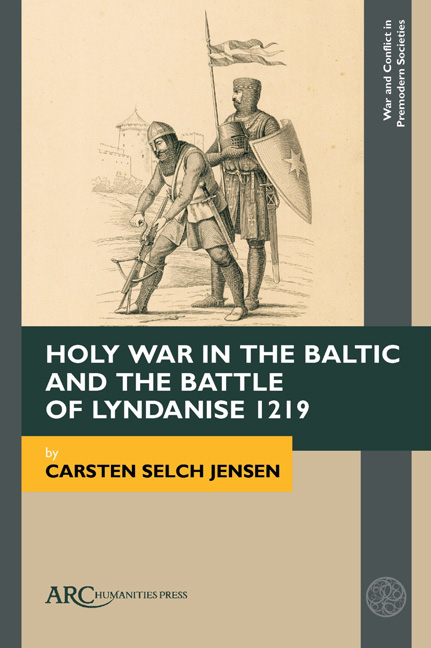Book contents
- Frontmatter
- Contents
- List of Illustrations
- Acknowledgments
- Introduction. Holy War in the Baltic and the Battle of Lyndanise 1219
- Chapter 1 Foreign Shores—Foreign People: The Medieval Baltic and its People
- Chapter 2 Fighting God’s War: Papal Crusading Politics in the Baltic from the Early 1100s until the Early 1200s
- Chapter 3 A Society Organized for War: Denmark at the Beginning of the Thirteenth Century
- Chapter 4 Competing Powers: The German Mission in Livonia and the Initial Quest for Estonia
- Chapter 5 Waging War in the Wilderness: Western Military Traditions Meet Baltic Traditions
- Chapter 6 The Danish Expedition to Estonia in 1219 and the Battle of Lyndanise
- Chapter 7 Conquering Hearts and Minds: The Aftermath of the Battle
- Conclusion A Penny in the Box: How Estonia Came to Save Denmark
- Select Bibliography
- Index
Chapter 4 - Competing Powers: The German Mission in Livonia and the Initial Quest for Estonia
Published online by Cambridge University Press: 08 May 2024
- Frontmatter
- Contents
- List of Illustrations
- Acknowledgments
- Introduction. Holy War in the Baltic and the Battle of Lyndanise 1219
- Chapter 1 Foreign Shores—Foreign People: The Medieval Baltic and its People
- Chapter 2 Fighting God’s War: Papal Crusading Politics in the Baltic from the Early 1100s until the Early 1200s
- Chapter 3 A Society Organized for War: Denmark at the Beginning of the Thirteenth Century
- Chapter 4 Competing Powers: The German Mission in Livonia and the Initial Quest for Estonia
- Chapter 5 Waging War in the Wilderness: Western Military Traditions Meet Baltic Traditions
- Chapter 6 The Danish Expedition to Estonia in 1219 and the Battle of Lyndanise
- Chapter 7 Conquering Hearts and Minds: The Aftermath of the Battle
- Conclusion A Penny in the Box: How Estonia Came to Save Denmark
- Select Bibliography
- Index
Summary
THE MAJOR RIVAL to the Danes and their expansion into Estonia was the German mission in Livonia. This mission had taken roots in the mid-1180s not long after the first attempts had been made to establish a formal (Danish) mission in Estonia through the consecration of Bishop Fulco. While we do not know if anything actually came of this early attempt to convert the Estonians, German clerics managed to establish themselves in Livonia along the lower runs of the Daugava River, connecting the market places of western Livonia with the rich markets of the Rus’ lands further to the east.
The early history of the Livonian Church is described in great detail, although with a strong supportive bias towards the Germans by the aforementioned chronicler, Henry of Livonia. In his chronicle, German priests and missionaries (who also included Henry himself), and the Livonian Church headed, in turn, by the bishops Meinhard (r. 1186–1196), Bertold (r. 1196–1198), and Albert are portrayed essentially as God's only true representatives among the local (pagan) people. Any encroachment by foreign (ecclesiastical) powers was fiercely opposed by the Livonian Church as well as by Henry himself. Primary among these foreign powers were, of course, the Danes and to a lesser extent, the Swedes and the Norwegians.
The Chronica Livoniae is, in essence, the foundational narrative of the German mis-sion in Livonia and Estonia and, therefore, a very important source with regards to the various aspects of the conquests of these lands. In the chronicle, Henry explains, how Meinhard came to Livonia in the early 1180s together with some German merchants who had sailed there in order to trade at the local market in Ikšķile. This village lay near an important crossing over Daugava River and was an key centre in the region's travel networks. It was a well-chosen starting point for the intended mission. The sources indicate that Meinhard had been sent to Livonia by the archbishop of Hamburg-Bremen as part of a well-planned attempt to establish a permanent mission among the pre-dominately pagan Livs who inhabited these lands.
- Type
- Chapter
- Information
- Holy War in the Baltic and the Battle of Lyndanise 1219 , pp. 61 - 72Publisher: Amsterdam University PressPrint publication year: 2024



